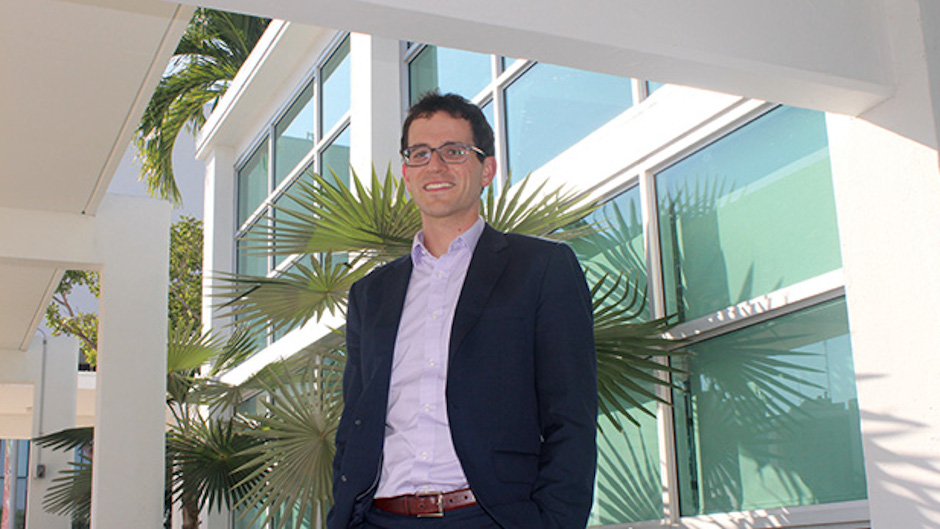"I know occupational licensing sounds pretty wonky," says Gabriel Scheffler, Miami Law's recently hired Associate Professor of Law in the fields of health law and policy, administrative law, and occupational regulation. "But it's a rich topic. The percentage of workers holding a license has grown substantially over the last few decades. It affects not only doctors and lawyers, but also professions you might not think of—like barbers and cosmetologists. Licensing has important impacts on the labor market and on access to health care, and touches on issues related to federalism, antitrust, and regulatory politics."
The California native first became interested in occupational licensing as a law student at Yale. His enthusiasm deepened when he served as a staff economist at the White House Council of Economic Advisers, where he worked on health care and labor market policy, including policies related to licensing.
"It's been an exciting issue to work on," he says. "It is a subject that has gotten a lot of interest from both liberals and libertarian conservatives for different reasons. It's refreshing in this intensely partisan environment to find one area where you have people with divergent political perspectives trying to find some common ground."
Scheffler grew up in a cerebral family in Berkeley, California: his father was a philosophy professor at the University of California, Berkeley, and is now at New York University. His mother is a docent at the Metropolitan Museum of Art; his older brother is a poet as well as a college writing instructor.
"My own areas of interest were slower to develop than my brother's," says Scheffler, "though I was always interested in policy and the news and politics. When I was growing up, I was especially interested in environmentalism. As a kid, I had the idea that I wanted to be a naturalist, though I couldn't really explain what that meant; I thought I wanted to be someone like Jane Goodall."
"It's important to me to have a career where I feel that I can have a tangible impact on the world, but I also enjoy doing research," he says. "I like thinking deeply about legal and policy questions and writing about them in depth. Teaching at a law school is the best way to combine those two interests, and the University of Miami is an incredibly exciting place to be."
Another topic that is acutely interesting to Scheffler concerns the effects of expanding health care coverage, in particular, the effects of the Affordable Care Act (ACA). This was the subject of his job market paper, which examined how expanding health insurance coverage indirectly creates pressure to change regulations governing hospitals and doctors.
"There is an important body of research that finds that the expansion of health insurance coverage improves individuals' access to health care, financial security, and health outcomes. My argument is that in addition to these effects on individuals, health insurance expansions also have more indirect effects on the laws governing the so-called health care 'delivery system'—that is, the laws that regulate how doctors, hospitals, and other health care providers deliver care to patients.
"More specifically, health insurance expansions tend to increase the demand for health care, and in doing so, they catalyze policymakers to experiment with reforms to delivery system regulations. For instance, both the 1965 Medicare and Medicaid legislation, as well as the 2010 ACA, generated substantial concern when they were enacted that there was not a sufficient supply of doctors and nurses to provide care to newly insured patients," he says. "That, in turn, created momentum to change the regulations governing the supply of health care, such as scope of practice restrictions on non-physician providers. I argue that recognizing this relationship has important implications for the future of health care reform: it suggests that one way to achieve more fundamental reforms to the delivery of health care is to further expand health insurance coverage."
Scheffler has also published research on other topics related to health law and regulation, including an article in the Administrative Law Review Accord (co-authored with Professor Cary Coglianese of the University of Pennsylvania School of Law), which argues that Congressional attempts to repeal the ACA in 2017 undermined the justification for regulatory reform proposals that would increase congressional involvement in the rulemaking process. They argue that Congress's repeal efforts show that, perhaps counterintuitively, increasing Congressional involvement in the rulemaking process would make this process less transparent and deliberative.
Before joining Miami Law, Scheffler was a Regulation Fellow at the Penn Program on Regulation at the University of Pennsylvania and a Research Fellow at the Solomon Center for Health Law and Policy at Yale Law School. Prior to studying law at Yale, he was a Research Assistant at the Harvard Kennedy School's Center for International Development, where he worked on various projects relating to public sector corruption in developing countries and U.S. healthcare policy. At Miami, Scheffler taught Torts in the fall and Health Law and Policy in the spring and is a guest lecturer at UM's interdisciplinary course, Hospitals, Health Care Services, and Access.
Outside his professional life, Scheffler and his wife, Dr. Elizabeth Bast, who recently finished her medical residency at the Hospital of the University of Pennsylvania and is now a primary care physician at the Veteran's Administration Hospital in Miami, are runners and have been exploring Coconut Grove and beyond by fleet foot. They have a dog, Zoe, a mixed-breed rescue pup who is still getting accustomed to the heat.

